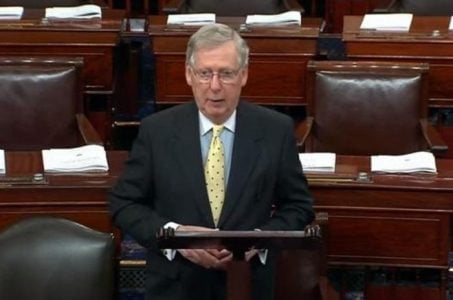Kentucky Horse Racing Industry Leaders, Proponents Call for Lawmakers to Save HHR
Posted on: December 14, 2020, 11:04h.
Last updated on: December 15, 2020, 11:28h.
Kentucky lawmakers heard testimony on Monday from supporters and opponents of historical horse racing (HHR). Those are machines that the state’s Supreme Court said did not meet the definition of pari-mutuel wagering in an opinion earlier this year.

The dilemma threatens a signature industry in the state, racing officials and supporters told members of the Interim Joint Committee on Licensing, Occupations, and Administrative Regulations. They urged the General Assembly to take action when the lawmakers gather in Frankfort for the odd-year short session that starts next month. Racing industry leaders are also asking the court to reconsider its decision.
HHR machines have the look and feel of slots, but base their outcomes on a combination of previously run races. Proponents say the tie-in with races makes it a legal pari-mutuel concept, similar to wagers like a Pick 6. However, in a court case that started nearly a decade ago, the state’s top justices agreed with the Family Foundation of Kentucky that it did not.
Ashli Watts, president and CEO of the Kentucky Chamber of Commerce, said the Supreme Court’s ruling came at time when tracks were opening or announcing new HHR parlors across the state.
“We’re counting on the General Assembly to take action so that these businesses – which are so important to our economic growth and development – are able to continue investing in our Commonwealth,” she said.
Tracks across the state have used the casino-style parlors to draw bettors and generate new revenues that have, in turn, increased purses and helped attract larger fields and better horses, jockeys, and trainers.
Big Money in HHR
Last month, Kentucky’s six HHR parlors reported a handle of $304.8 million, with net revenues totaling $22 million. For the five months of fiscal year, 2021, the racinos have reported a handle of $1.5 billion and net revenues of $106.7 million.
The state has received $9.3 million in taxes over the five-month span.
Since HHR started in Kentucky in 2011, bettors have wagered $9.5 billion. The state has received $57.2 million in tax revenue.
Opposition Attorney: Amendment Needed, Not a Law
Stan Cave, the lawyer representing the Family Foundation, told the committee that the biggest problem with the machines is that they require tracks to supply seed money for the jackpots. That money, Cave said, reciting the Supreme Court opinion, makes the racetrack like a casino, and takes the mutual aspect out of the equation.
He also noted that the tracks have continued to operate the racinos even after the ruling. It’s an attempt for the industry to coerce lawmakers into siding with them or possibly be blamed for any job loss or damage to the industry.
“This is not a problem that you created,” Cave told lawmakers.
He added that the tracks will be asking them to define slot-style gaming as a form of pari-mutuel wagering, which would go against nearly 150 years of legal precedent.
The only way to solve the problem would be to amend the constitution, Cave said.
Senate Leader Confronts Family Foundation
State Sen. Damon Thayer, the Senate Majority Leader, set his sights on the Family Foundation and Executive Director Kent Ostrander with some pointed remarks during the committee hearing.
He said the group threw a “hissy fit” when he first proposed HHR legislation a decade ago. That bill never made it out of a committee, and prompted him to seek an opinion from then-Attorney General Jack Conway as to whether the game was a form of pari-mutuel wagering.
Conway agreed in his opinion, and that opened the door for the Kentucky Horse Racing Commission to establish the rules for it.
Thayer, R-Georgetown, added that HHR has helped grow the state’s thoroughbred racing industry, creating jobs and helping people better their lives. One particular worker is a 30-year-old single mom who is a hot walker for horses at a training center. Thayer said she’s working so she can go to college and get a better job for her family.
While it appears to me that the Family Foundation has been on a 10-year rant to help destroy Kentucky’s position as the horse capital of the world, I ask Mr. Ostrander, what about – since you purport to represent families – what about the families of these workers? These 100,000 jobs supported by the equine industry in Kentucky,” Thayer asked.
Ostrander offered an apology, saying that the Foundation was just trying to take a stand at the time.
He also noted that for years, the Family Foundation and the racing industry worked together to keep casinos from entering the state. That changed about 20 years ago, when racing interests flipped their position.
And when the Family Foundation saw state leaders move away from approving HHR through the legislature, Ostrander said they decided to act.
“If gambling was going to be expanded, it needed to be expanded legally,” he said.
Related News Articles
Most Popular
FTC: Casino Resort Fees Must Be Included in Upfront Hotel Rates
Genovese Capo Sentenced for Illegal Gambling on Long Island
NBA Referees Expose Sports Betting Abuse Following Steve Kerr Meltdown
UPDATE: Former Resorts World & MGM Grand Prez Loses Gaming License
Most Commented
-
UPDATE: Whiskey Pete’s Casino Near Las Vegas Closes
— December 20, 2024 — 30 Comments -
Caesars Virginia in Danville Now Accepting Hotel Room Reservations
— November 27, 2024 — 9 Comments -
UPDATE: Former Resorts World & MGM Grand Prez Loses Gaming License
— December 19, 2024 — 8 Comments -
FTC: Casino Resort Fees Must Be Included in Upfront Hotel Rates
— December 17, 2024 — 7 Comments
















No comments yet